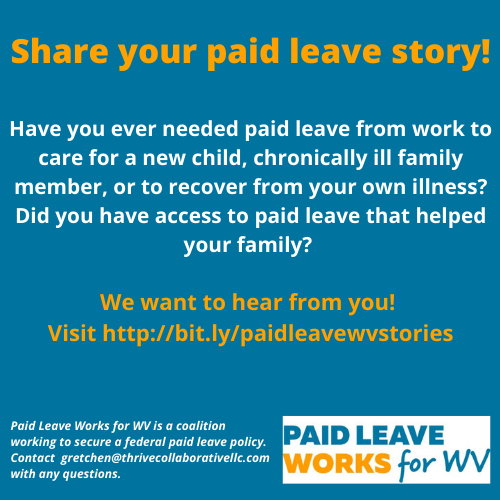Last month, President Biden announced the American Families Plan (AFP) proposal, featuring major investments in K-12 education, child care, higher education, health care, and paid leave, as well as extended tax cuts for families and workers with children.
The AFP also includes revenue-raising proposals that would affect only very high-income taxpayers. And while the benefits of the AFP would be broadly shared, these tax increases would impact only .01 percent of West Virginia taxpayers — the smallest share in the nation — and work toward a tax system that raises more adequate revenue from those who have seen disproportionate income wealth gains in recent decades.
Learn more in Sean’s full blog post.
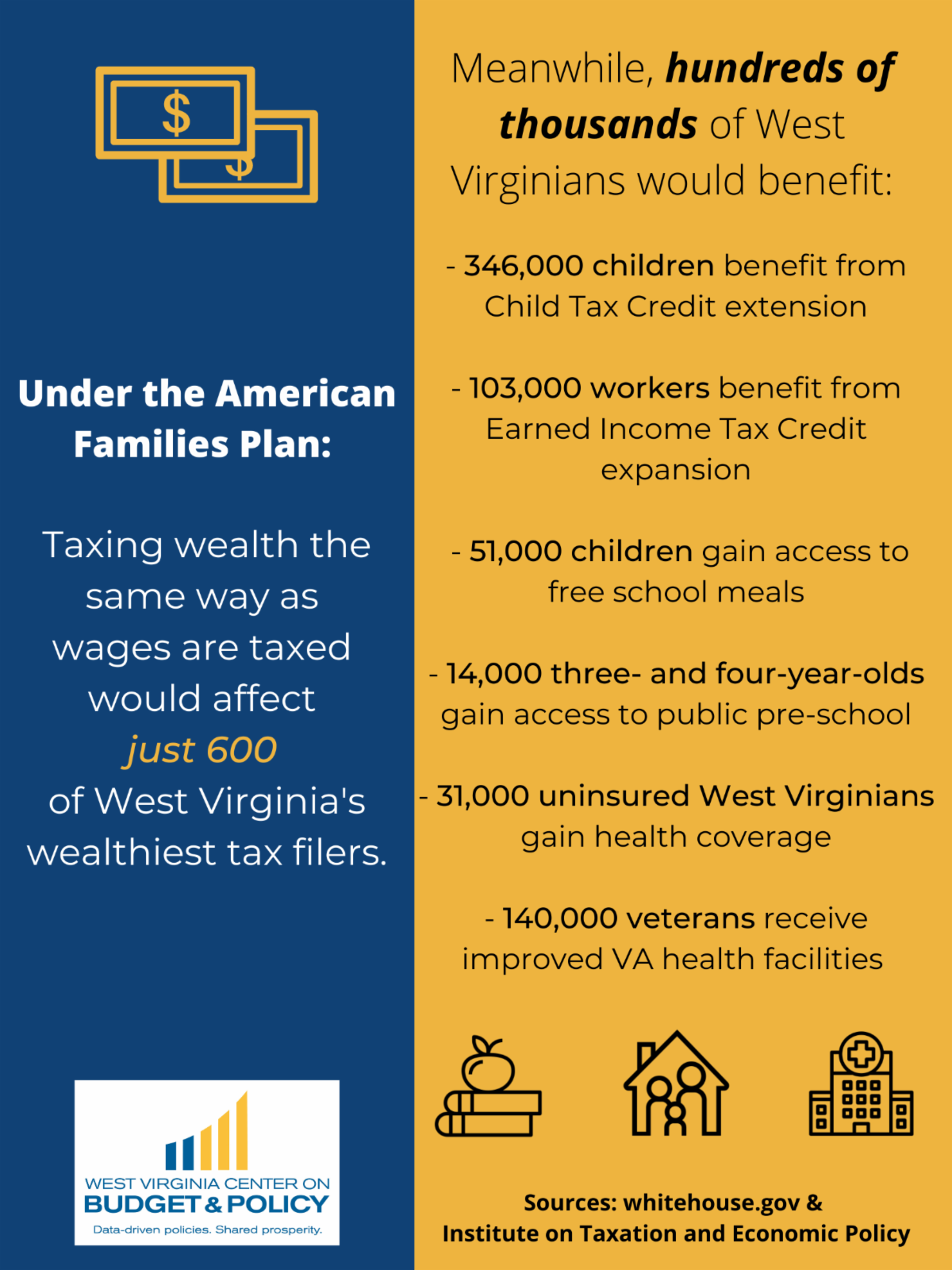
Under the American Rescue Plan Act (ARPA), West Virginia state government will receive $1.355 billion and cities, municipalities, and counties will receive a total of $676.6 million. ARPA funds are already flowing into communities and our state and can be used on eligible costs incurred through December 31, 2024.
Our new Fast Facts sheet highlights both best practices and US Department of the Treasury guidance to inform government officials and residents about the parameters for spending and the best ways to utilize these funds to make long-term improvements in our communities.
Treasury has identified five key areas of approved usage for ARPA Fiscal Recovery Funds. The Interim Final Rule gives governments significant flexibility to use the Fiscal Recovery Funds to help the many people still struggling in our ongoing pandemic economy. It also allows governments to begin to reverse and address many longstanding racial and economic inequities that the pandemic further exposed and exacerbated.
The five categories of approved fund usage are to:
– Support Public Health Expenditures
– Address Negative Impacts Caused by the Public Health Emergency
– Replace Lost Public Sector Revenue
– Provide Premium Pay for Essential Workers
– Invest in Water, Sewer, & Broadband Infrastructure
You can find further explanation of each of the above categories, as well as examples of expenditures by category in the full Fast Facts sheet here.
For additional information, check out West Virginians for Affordable Health Cares’ American Rescue Plan WV County and City Funds Toolkit.

WVCBP’s Summer Policy Institute (SPI) is an annual event for college students, graduate students, and high school youth interested in bettering West Virginia through policy change. SPI brings together highly qualified traditional and non-traditional applicants to build policy knowledge, leadership skills, and networks.
Attendees participate in interactive sessions where they learn the basics of data, policy, and state government and build their organizing and advocacy skills. Throughout the convening, attendees work in small groups to identify and develop policy proposals to shape the future they want to see in West Virginia, culminating in team “policy pitches” to state legislators and policy professionals. Many SPI attendees have gone on to continue advocating for their policy idea and to hold internships with West Virginia non-profits and in state government.
SPI alum Matt Witt recently graduated with dual masters degrees in social work and public administration from WVU and is now set to launch his post-grad career continuing to serve folks in the Mountain State. In a recent op-ed, he writes about what attending SPI meant to him:
“This experience solidified my desire to stay in and serve West Virginia upon graduation, and it also connected me with relationships and job opportunities that could help me do just that.
“There’s been a lot of focus recently on how we can get young people to stay in our state, as well as how we might attract out-of-staters who might be looking to relocate here. In addition to having policies in place that make our state more welcoming to diverse populations of people, we also must foster connections and opportunities for our young people to do meaningful work here — either professionally or in their free time.
“The Summer Policy Institute provides a great place for young people to find that spark and the networks needed to launch a career in the Mountain State.”
There is still time to apply for this year’s SPI! Registration is open through June 1. You can find further details and link to apply here.
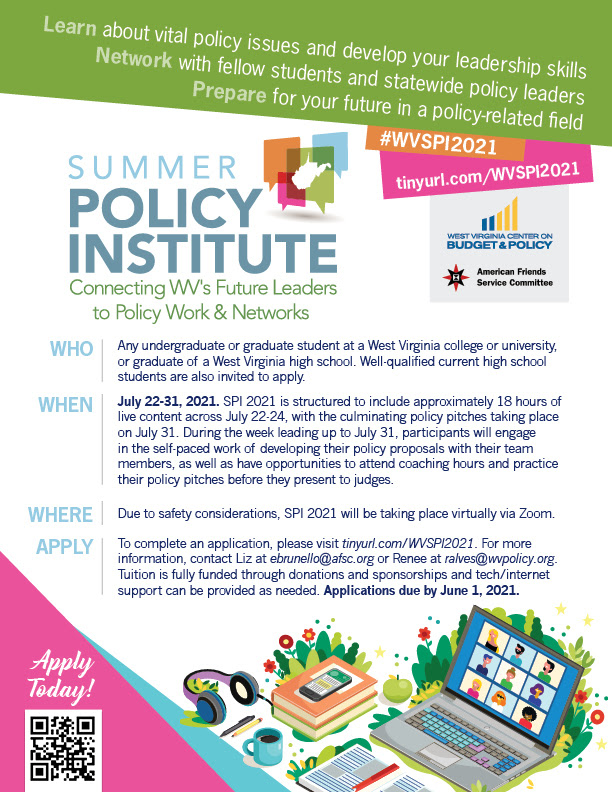
WVCBP’s new Elevating the Medicaid Enrollment Experience (EMEE) Voices Project seeks to collect stories from West Virginians who have struggled to access Medicaid across the state. Being conducted in partnership with West Virginians for Affordable Health Care, EMEE Voices will gather insight to inform which Medicaid barriers are most pertinent to West Virginians, specifically people of color. Existing data asserts that structural barriers and stigma impact Black and brown West Virginians’ interactions with the Medicaid program. However, more precise investigation is necessary for specifying these disparities and transforming them into meaningful policy choices. Overall, this project will synthesize quantitative data with the stories collected to provide a holistic understanding of Medicaid barriers. Addressing the obstacles West Virginians of color face will improve Medicaid for all West Virginians, contributing to a healthier state.
Do you have a Medicaid enrollment story to share? We’d appreciate your insight. If you are a Medicaid enrollee, please tell us about your experience here. If you are a Medicaid provider, please fill out our questionnaire here.
You can watch WVCBP’s health policy analyst Rhonda Rogombé and West Virginians for Affordable Health Care’s Mariah Plante further break down the new project and its goals in this FB live from last week.
You can find full project details on our webpage here.

Last week, Gov. Jim Justice joined Republican governors from across the country and announced his decision to forgo enhanced federal unemployment insurance benefits, arguing that they are contributing to a “labor shortage” in the state. However, recent economic data does not support this claim. WVCBP senior policy analyst Sean O’Leary breaks it all down in his recent blog post.
A Charleston Gazette-Mail article from this week includes further insight from Sean on why Gov. Justice’s decision is misguided and how it will hurt West Virginians and our state economy. Excerpt below:
“The unemployment benefits have been a lifeline, both to the workers who have received them and to the economy as a whole,” he said Tuesday. “That is all federal money circulating in West Virginia’s economy right now, supporting businesses and paying for utilities, groceries and rent. The loss could potentially slow down the state’s recovery, but the implication for those workers and their families is even greater.”
“I think the best incentive to encourage people to return to work is the same as it always has been: A livable wage, access to health care, paid sick leave, retirement benefits and the ability to balance work and family,” O’Leary said. “We should want these for all West Virginia workers.”
You can read the full Gazette-Mail article here and Sean’s full blog post here.
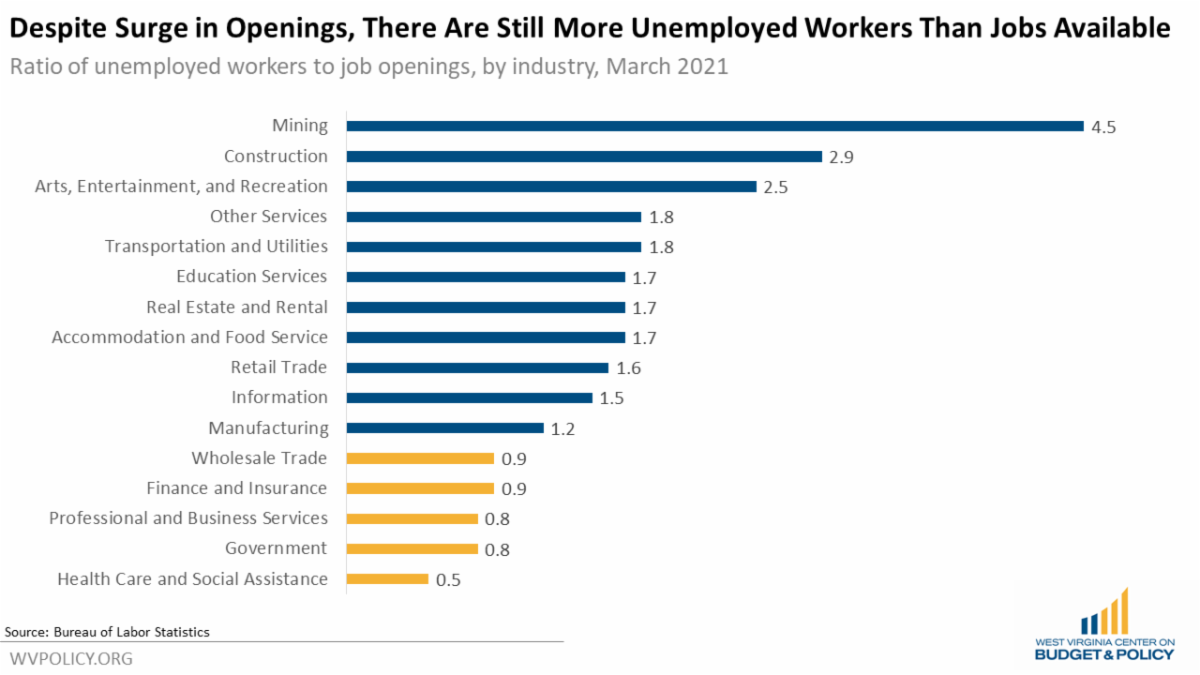
The American Families Plan (AFP) is a historic opportunity to support the success of families and workers, and few places in the country will benefit as much as West Virginia – but only if the plan is passed.
Have you been impacted by lack of access to child care? We welcome you to share your experience with us by completing our survey. We’d appreciate your insight — responses will be used to help us show our leaders in Congress just how much the AFP would serve parents in the Mountain State.
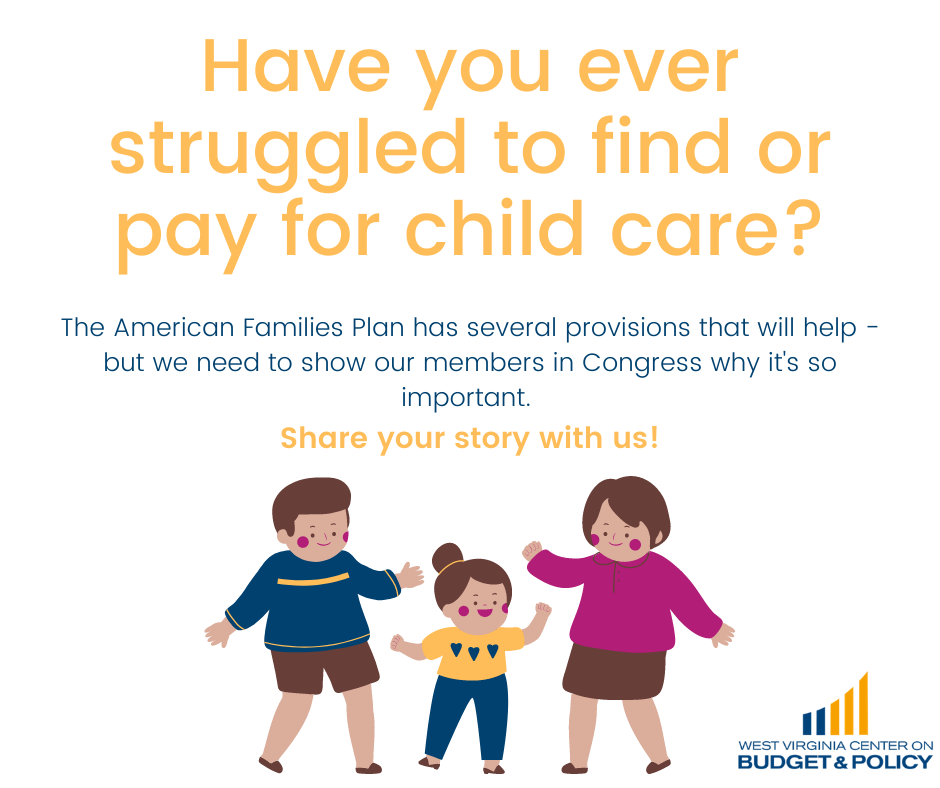
The Food for All coalition — along with 150+ signees including charitable food access agencies, food system practitioners, nutrition and health care professionals, directly impacted constituents, and more — have written Senators Manchin & Capito to vote to pass the American Families Plan and provide critical support to address food insecurity and poverty in West Virginia. This initiative would significantly reduce the food access barriers and burdens faced by hundreds of thousands of households in our state.
You can read the full letter here.
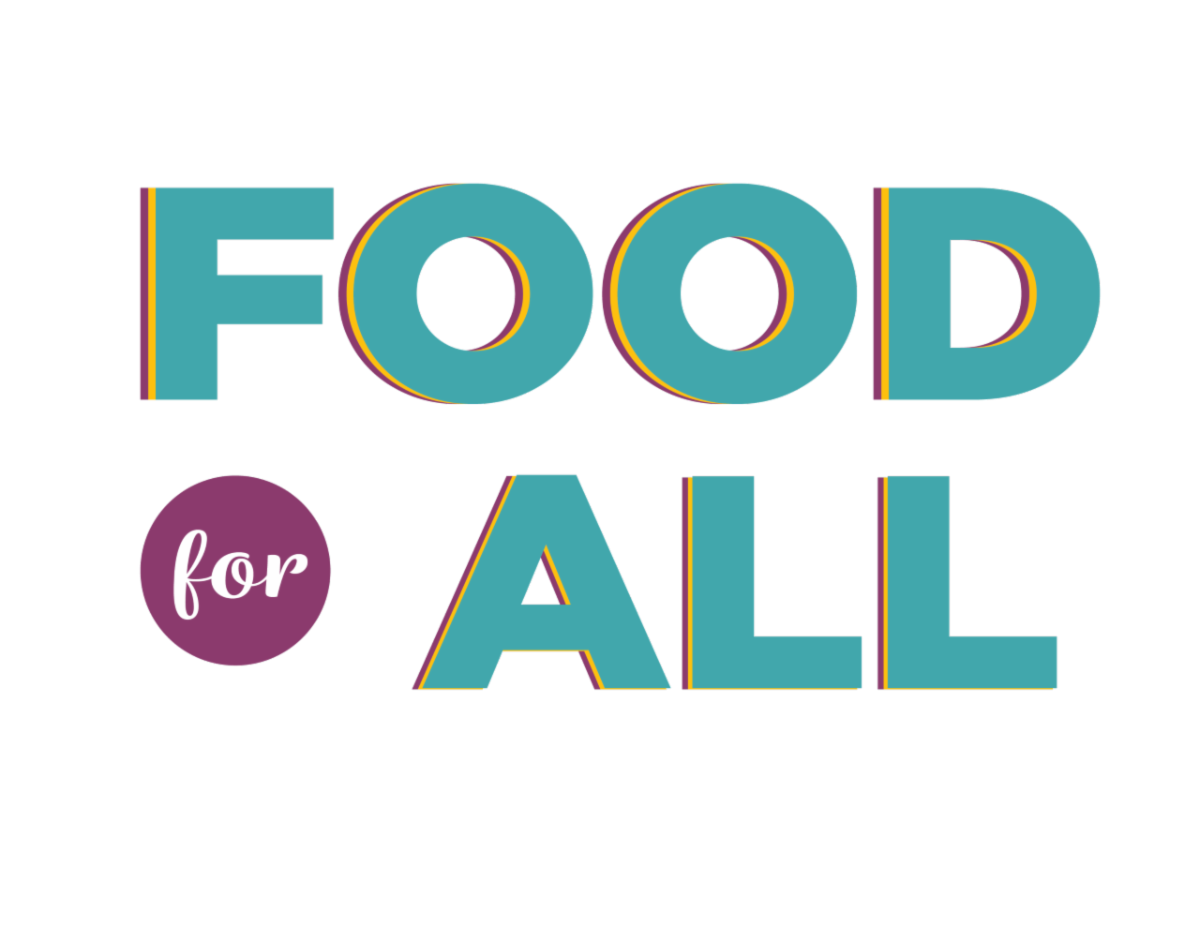
WVCBP is thrilled to announce that we welcomed two incredible summer research associates to the team this week. You can get to know a little about Myya and Tamicah in their bio blurbs below:
A native West Virginian, Myya Helm holds a B.A. in political science and international studies from West Virginia University. During her undergraduate career, she worked with WVU President E. Gordon Gee to address racial bias within the university policing system, facilitated anti-racist and gender-inclusive classroom trainings, and interned for West Virginia Delegate Danielle Walker. In the future, she hopes to obtain a doctoral degree in sociology, specializing in critical race and ethnic studies. She also loves to travel, learn new languages, and cook Japanese food!
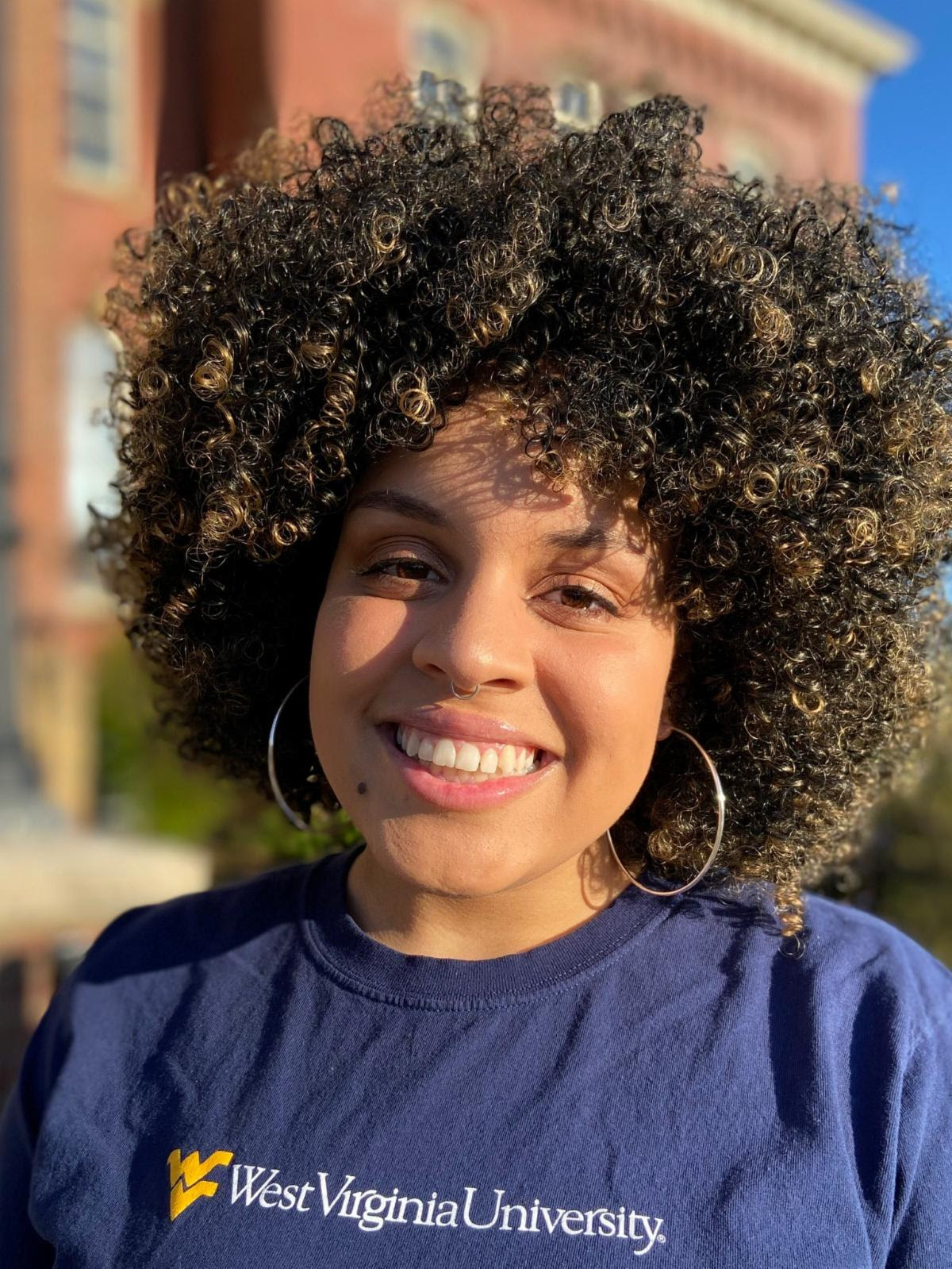
Tamicah Owens is originally from North Carolina, but she now calls West Virginia home. She is currently a PhD student in Educational Theory and Practice at West Virginia University. She holds a B.A. in English with North Carolina teacher licensure from the University of North Carolina at Wilmington and a Master’s in Instructional Design and Technology from West Virginia University. Tamicah’s research interests include rural adolescent education and Black girls’ literacy practices and identity formation.
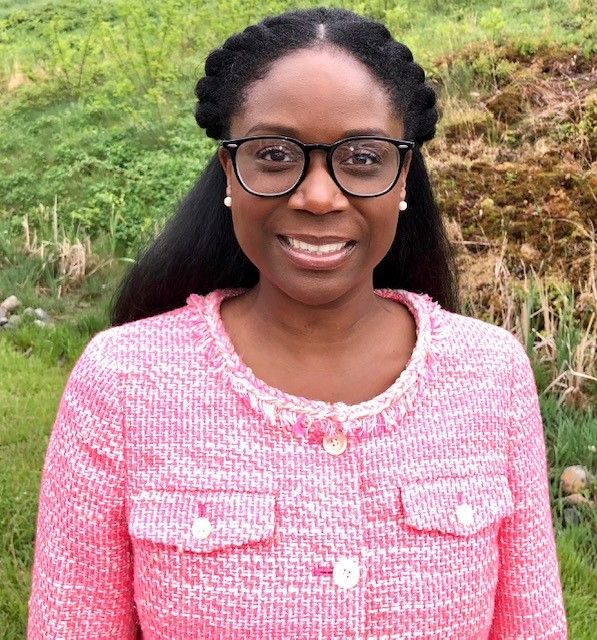
The Appalachia Prison Book Project is a West Virginia-based nonprofit that challenges mass incarceration through books, education, and community engagement. APBP sends free books to people imprisoned in six Appalachian states, hosts book clubs inside prisons in the region, and is leading an effort to bring for-credit college courses into prison.
APBP is excited to announce that they are offering two $2,500 education scholarships for the 2021-2022 academic year. Each scholarship will be awarded to a person who has been released form a West Virginia Department of Corrections and Rehabilitation (WVDCR) state prison or federal prison in WV and who will be beginning or continuing their undergraduate or graduate education at a college or university in WV. The applicant must have been released within three years of the application deadline.
You can find full scholarship details and instructions to apply here.

Paid Leave Works for WV (PLWWV) is a broad coalition of stakeholders focused on advocating for a robust paid family and medical leave policy that ensures no one has to choose between their job and caring for themselves or a loved one.
The coalition is looking to collect stories from across the Mountain State. If you and your family have benefited from paid leave or have struggled due to lack of access to paid leave, please share your story and help us advocate to make this policy available for all West Virginians. We encourage you to share the form with relevant friends and family members, too!
PLWWV has also begun a letter writing campaign to urge Senators Manchin and Capito to prioritize paid family and medical leave. You can send a letter here.
The WVCBP is a proud member of this new coalition. To stay up to date on the coalition’s work, follow them on Facebook, Twitter, and Instagram.
For more on the importance of paid leave and how it can help more women remain in the workforce, check out this recent article featuring insight from WVCBP executive director Kelly Allen.
